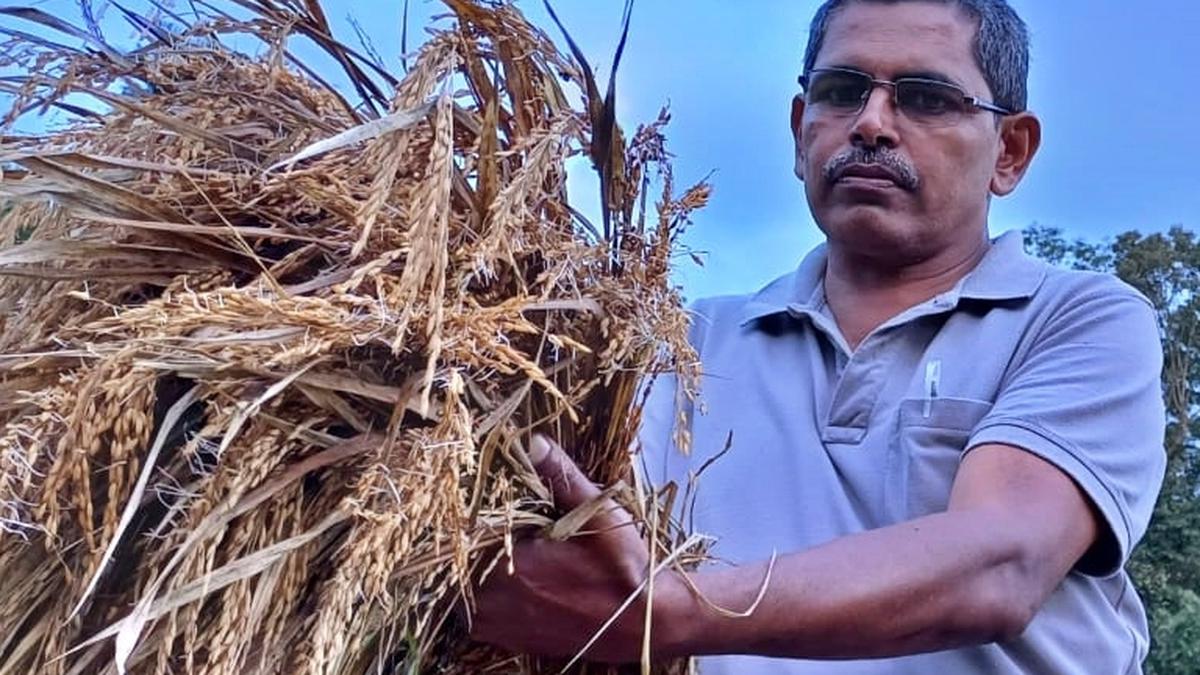
Unseasonal rain casts a cloud over farming communities in Wayanad
The Hindu
Expectations of a good coffee, pepper and paddy harvest have been dealt a body blow by the unseasonal rain lashing Wayanad
Expectations of a good coffee, pepper and paddy harvest have been dealt a body blow by the unseasonal rain lashing Wayanad, a major robusta coffee growing region in the country. The rain that lashed the district during the past five days has heightened farmers’ concerns about timely disposal of produce.
Incidents of harvested paddy getting soaked in unexpected rain were reported from various parts of the district including Thirunelly, Thrissilery, Appapara, Kozhuvana, Panavally, Kallur, Panamaram, Chekadi, Pakkom, and Cheeral. Several farmers in Thirunelly harvested the crop around seven days ago, but they were forced to keep it in the field itself as they could not thresh the produce, T. Santhosh Kumar under the Thirunelly Padashekhara Samithi, said.
Most farmers have cultivated traditional tall rice varieties such as Gandhkassala, Jeerakassala, Thondy, and Palthody by following the organic way.
Mr. Santhosh cultivated mainly the Gandhakassala variety on six acres. The farmer had spent around ₹40,000 for the cultivation of an acre, but he is not sure that he can recoup even half the amount. “We have to spend at least ₹10,000 more this year to process paddy and dry the rain-soaked hay,” Mr. Santhosh said. Farmers in the area prefer to cultivate the tall varieties since they have good demand and better prices in the market, especially for making huts in resorts,” he added.
But the lodging nature of tall varieties of rice plants during rain is a major concern for farmers, Mr. Santhosh said. Once the plants are lodged, farmers cannot use combined harvesters to harvest the crop. Manual harvest is more expensive. The dearth of skilled workers has also put farmers in a tight spot, he added.
Most farmers have insured their paddy crops by paying a premium of ₹100 an acre but they may not benefit from it as standing crops alone come under the purview of insurance. Hence, the farmers have urged the government to pay compensation by including crops destroyed in natural calamities.
Though combined harvesters were brought to the district from neighbouring Tamil Nadu and Karnataka a few weeks ago, the machines were yet to be operated due to the unseasonal rain.

“He travels fastest who travels alone”. M.V. Murthy has substantiated that thought from Rudyard Kipling. In 12 years, he has set 8,125 saplings in soil and seen them through to maturity. He has gone it alone — at multiple levels. No volunteers to work shoulder to shoulder with. No fundraising to support the purchase of native-tree saplings and tree guards. The only “volunteer” who tags along with Murthy on every tree-planting spree is his steadfastly loyal Honda Activa. The only source of funding is his wallet. At 5.30 a.m., when people are snoozing alarms, Pasumai Murthy (as he is popularly known) ranges around some Chennai neighbourhood, a plastic pot filled with water lodged in the wide floorboard of his step-through scooter After serving the saplings their “breakfast”, he gets his own, and around 9 a.m., the Activa is headed to his workplace, which lacks a fixed address. An assistant manager with Ramaniyam Builders, he is not desk-bound, his brief requiring him to visit construction sites. While strapping on the ratchet-type safety helmet, he puts on an invisible green cap. During the visits to those work sites, his mind maps spots where the Chennai sun stings the hardest, shadows being scarce. These are stark landscapes devoid of trees to offer respite from a glaring sun. In May 2013, at Vannanthurai junction, not far from his diggings in Vannanthurai in Adyar, the absence of something familiar made him acutely aware of it. A stand of trees had been removed on account of road expansion. A couple of children ran barefoot on baking tar. Elders leaned helplessly against sun-scorched compound walls. “That moment hit me,” he says. “If we can cut down trees in a day, why not grow them with equal urgency?” On August 15 that year, at Adyar Junction, he hoisted the national flag, distributed sweets, and planted 15 saplings. He was not doing anything radical, only following a rule that seldom budges from the paper it is printed on. For every tree that is felled on account of development, ten others need to be planted. People could process tree-planting exercises by groups, but not by a lone wolf. Sneers came his way; he smiled them off. He recalls being ridiculed by visitors to a Corporation gym while planting saplings at Besant Nagar beach. Now, he counts those same faces among his host of supporters, his consistent efforts to plant saplings and water them earning him their admiration. The admiration derives in part from the fact that he digs into his own pocket to keep this service going — well, growing. At a time, he buys a bundle of net-type material costing ₹1,700 out of which 25 tree guards can be made, on an average. For support to those tree guards, he buys 50 iron rods (thick and six feet long) which set him back by anywhere between ₹5000 and ₹6,000 depending on their weight. And he buys saplings from a nursery in Akkarai where he is assured of a discount by virtue of being a long-time buyer. Obviously, given the financial sacrifice all of this entails, he has got buy-in from his family to do this service. Being reasonable in the allocation of time has helped him win them over: the first half of every Sunday he reserves for tree-planting and the course of the second half is scripted by his wife Maria Priya and his daughter Meha M. He has received a doctorate degree from the The Academy of Universal Global Peace for this work.





















 Run 3 Space | Play Space Running Game
Run 3 Space | Play Space Running Game Traffic Jam 3D | Online Racing Game
Traffic Jam 3D | Online Racing Game Duck Hunt | Play Old Classic Game
Duck Hunt | Play Old Classic Game










